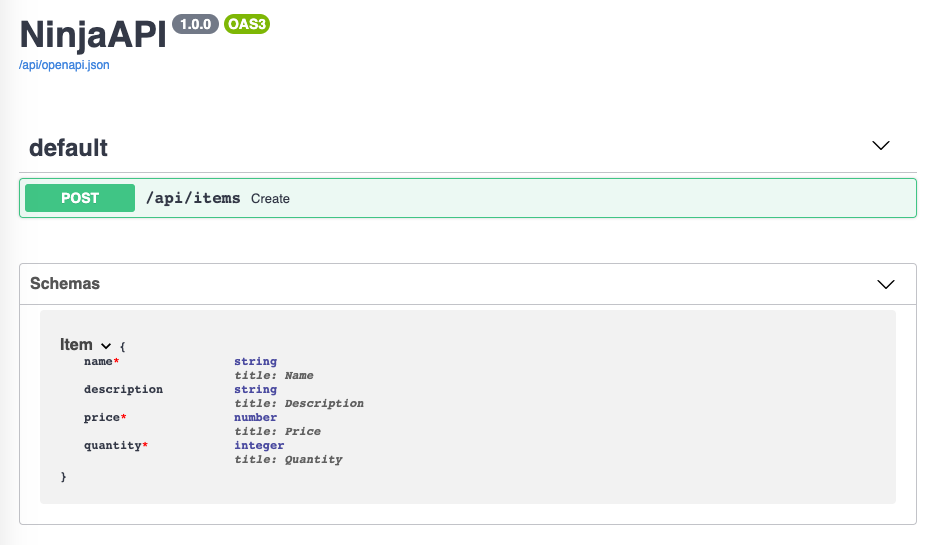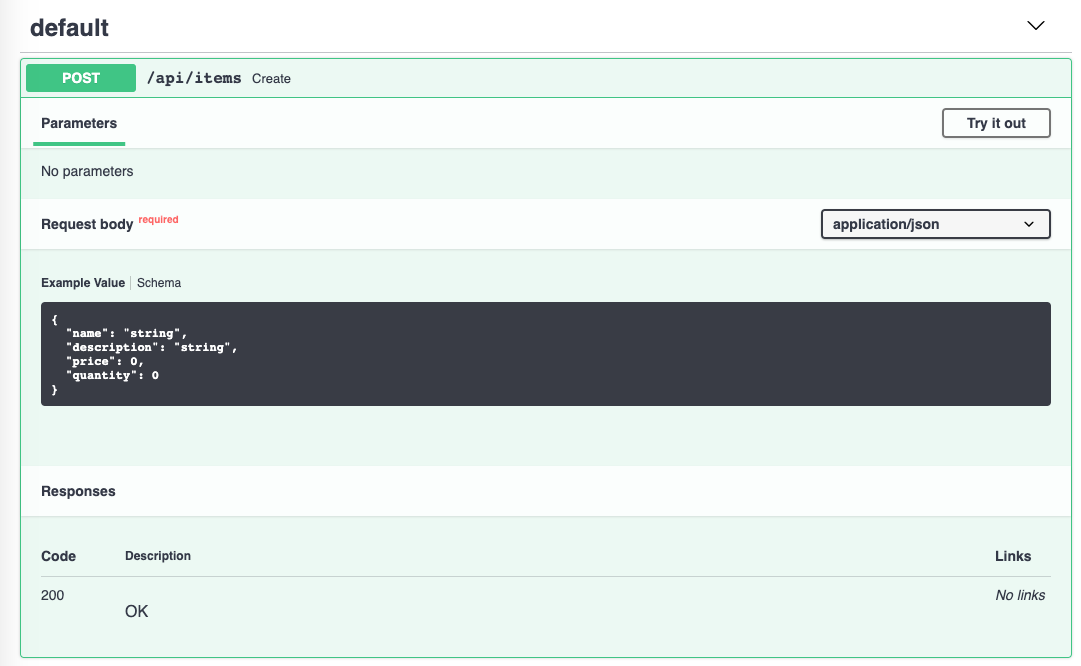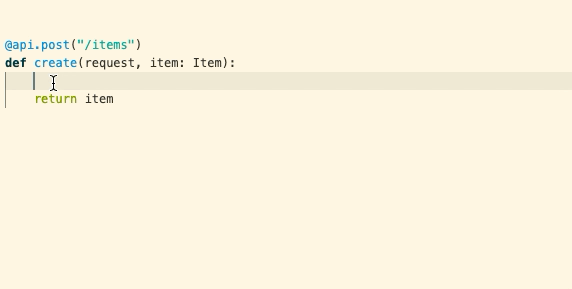Request Body
Request bodies are typically used with “create” and “update” operations (POST, PUT, PATCH). For example, when creating a resource using POST or PUT, the request body usually contains the representation of the resource to be created.
To declare a request body, you need to use Django Ninja Schema.
Info
Under the hood Django Ninja uses Pydantic models with all their power and benefits.
The alias Schema was chosen to avoid confusion in code when using Django models, as Pydantic's model class is called Model by default, and conflicts with Django's Model class.
Import Schema
First, you need to import Schema from ninja:
from typing import Optional
from ninja import Schema
class Item(Schema):
name: str
description: Optional[str] = None
price: float
quantity: int
@api.post("/items")
def create(request, item: Item):
return item
Create your data model
Then you declare your data model as a class that inherits from Schema.
Use standard Python types for all the attributes:
from typing import Optional
from ninja import Schema
class Item(Schema):
name: str
description: Optional[str] = None
price: float
quantity: int
@api.post("/items")
def create(request, item: Item):
return item
Note: if you use None as the default value for an attribute, it will become optional in the request body.
For example, this model above declares a JSON "object" (or Python dict) like:
{
"name": "Katana",
"description": "An optional description",
"price": 299.00,
"quantity": 10
}
...as description is optional (with a default value of None), this JSON "object" would also be valid:
{
"name": "Katana",
"price": 299.00,
"quantity": 10
}
Declare it as a parameter
To add it to your path operation, declare it the same way you declared the path and query parameters:
from typing import Optional
from ninja import Schema
class Item(Schema):
name: str
description: Optional[str] = None
price: float
quantity: int
@api.post("/items")
def create(request, item: Item):
return item
... and declare its type as the model you created, Item.
Results
With just that Python type declaration, Django Ninja will:
- Read the body of the request as JSON.
- Convert the corresponding types (if needed).
- Validate the data.
- If the data is invalid, it will return a nice and meaningful error, indicating exactly where and what the incorrect data was.
- Give you the received data in the parameter
item.- Because you declared it in the function to be of type
Item, you will also have all the editor support (completion, etc.) for all the attributes and their types.
- Because you declared it in the function to be of type
- Generate JSON Schema definitions for your models, and you can also use them anywhere else you like if it makes sense for your project.
- Those schemas will be part of the generated OpenAPI schema, and used by the automatic documentation UI's.
Automatic docs
The JSON Schemas of your models will be part of your OpenAPI generated schema, and will be shown in the interactive API docs:

... and they will be also used in the API docs inside each path operation that needs them:

Editor support
In your editor, inside your function you will get type hints and completion everywhere (this wouldn't happen if you received a dict instead of a Schema object):

The previous screenshots were taken with Visual Studio Code.
You would get the same editor support with PyCharm and most of the other Python editors.
Request body + path parameters
You can declare path parameters and body requests at the same time.
Django Ninja will recognize that the function parameters that match path parameters should be taken from the path, and that function parameters that are declared with Schema should be taken from the request body.
from ninja import Schema
class Item(Schema):
name: str
description: str = None
price: float
quantity: int
@api.put("/items/{item_id}")
def update(request, item_id: int, item: Item):
return {"item_id": item_id, "item": item.dict()}
Request body + path + query parameters
You can also declare body, path and query parameters, all at the same time.
Django Ninja will recognize each of them and take the data from the correct place.
from ninja import Schema
class Item(Schema):
name: str
description: str = None
price: float
quantity: int
@api.post("/items/{item_id}")
def update(request, item_id: int, item: Item, q: str):
return {"item_id": item_id, "item": item.dict(), "q": q}
The function parameters will be recognized as follows:
- If the parameter is also declared in the path, it will be used as a path parameter.
- If the parameter is of a singular type (like
int,float,str,bool, etc.), it will be interpreted as a query parameter. - If the parameter is declared to be of the type of Schema (or Pydantic
BaseModel), it will be interpreted as a request body.